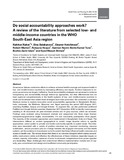| dc.contributor.author | Naher, Nahitun | |
| dc.contributor.author | Balabanova, Dina | |
| dc.contributor.author | Hutchinson, Eleanor | |
| dc.contributor.author | Marten, Robert | |
| dc.contributor.author | Hoque, Roksana | |
| dc.contributor.author | Tune, Samiun Nazrin Bente Kamal | |
| dc.contributor.author | Islam, Bushra Zarin | |
| dc.contributor.author | Ahmed, Syed Masud | |
| dc.date.accessioned | 2022-05-24T07:53:15Z | |
| dc.date.available | 2022-05-24T07:53:15Z | |
| dc.date.copyright | 2020 | |
| dc.date.issued | 2020-11-09 | |
| dc.identifier.citation | Naher, N., Balabanova, D., Hutchinson, E., Marten, R., Hoque, R., Tune, S. N. B. K., . . . Ahmed, S. M. (2020). Do social accountability approaches work? A review of the literature from selected low- and middle-income countries in the WHO south-east Asia region. Health Policy and Planning, 35, I76-I96. doi:10.1093/heapol/czaa107 | en_US |
| dc.identifier.uri | http://hdl.handle.net/10361/16663 | |
| dc.description | This article was published in Health Policy and Planning by Oxford Academic [ The Author(s) 2020. Published by Oxford University Press in association with The London School of Hygiene and Tropical Medicine] and the definite version is available at: https://doi.org/10.1093/heapol/czaa107 The Journal's website is at: https://academic.oup.com/heapol/article/35/Supplement_1/i76/5960441 | en_US |
| dc.description.abstract | Governance failures undermine efforts to achieve universal health coverage and improve health in
low- and middle-income countries by decreasing efficiency and equity. Punitive measures to improve governance are largely ineffective. Social accountability strategies are perceived to enhance
transparency and accountability through bottom-up approaches, but their effectiveness has not
been explored comprehensively in the health systems of low- and middle-income countries in
south and Southeast Asia where these strategies have been promoted. We conducted a narrative
literature review to explore innovative social accountability approaches in Bangladesh, Bhutan,
India, Indonesia, the Maldives, Myanmar and Nepal spanning the period 2007–August 2017,
searching PubMed, Scopus and Google Scholar. To augment this, we also performed additional
PubMed and Google Scholar searches (September 2017–December 2019) to identify recent papers,
resulting in 38 documents (24 peer-reviewed articles and 14 grey sources), which we reviewed.
Findings were analysed using framework analysis and categorized into three major themes:
transparency/governance (eight), accountability (11) and community participation (five) papers.
The majority of the reviewed approaches were implemented in Bangladesh, India and Nepal. The
interventions differed on context (geographical to social), range (boarder reform to specific
approaches), actors (public to private) and levels (community-specific to system level). The initiatives were associated with a variety of positive outcomes (e.g. improved monitoring, resource
mobilization, service provision plus as a bridge between the engaged community and the health
system), yet the evidence is inconclusive as to the extent that these influence health outcomes and
access to health care. The review shows that there is no common blueprint which makes accountability mechanisms viable and effective; the effectiveness of these initiatives depended largely on
context, capacity, information, spectrum of actor involvement, independence from power agendas
and leadership. Major challenges that undermined effective implementation include lack of capacity, poor commitment and design and insufficient community participation. | en_US |
| dc.language.iso | en_US | en_US |
| dc.publisher | Oxford Academic | en_US |
| dc.relation.uri | https://academic.oup.com/heapol/article/35/Supplement_1/i76/5960441 | |
| dc.subject | Health systems | en_US |
| dc.subject | Social accountability approaches | en_US |
| dc.subject | Transparency | en_US |
| dc.subject | Accountability | en_US |
| dc.subject | Community participation | en_US |
| dc.subject | Governance | en_US |
| dc.title | Do social accountability approaches work? A review of the literature from selected low- and middle-income countries in the WHO South-East Asia region | en_US |
| dc.type | Journal Article | en_US |
| dc.description.version | Published | |
| dc.contributor.department | Brac James P. Grant School of Public Health | |
| dc.identifier.doi | https://doi.org/10.1093/heapol/czaa107 | |
| dc.relation.journal | Health Policy and Planning | |

